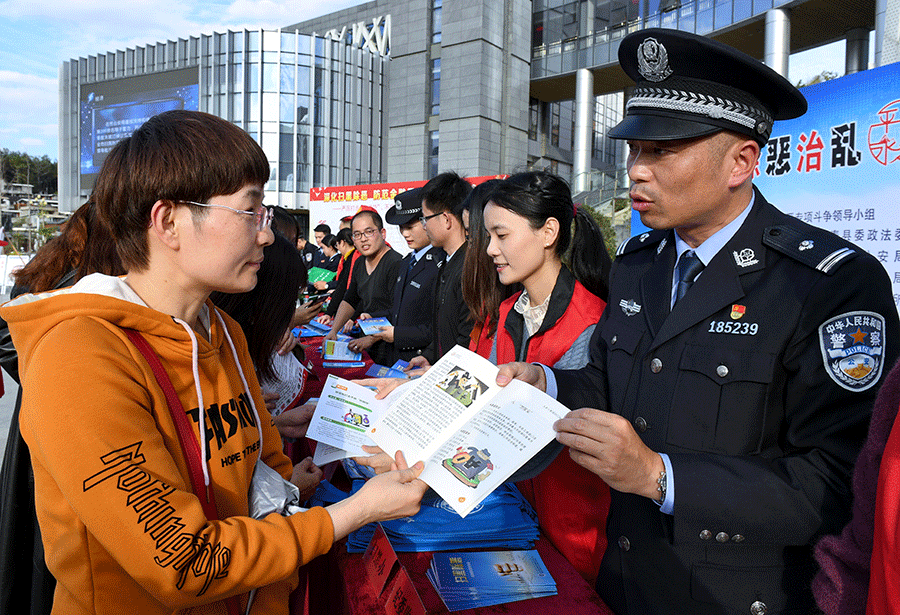Campaign smashes 'protective umbrellas'


Such crimes usually have connection with corruption, national office says
The nationwide special campaign cracking down on organized crime has smashed a batch of "protective umbrellas" behind mafia-like organizations and gangs, and major breakthroughs have been made in multiple cases in the past year.
Digging out the "protective umbrellas" behind gangs and organized crime is one of the focuses of the campaign, as the existence of such crimes is usually closely connected with corruption and duty crime, according to the national office against organized crime, operating under the Commission for Political and Legal Affairs of the CPC Central Committee.
By November, three rounds of inspection and follow-up visits, which were led by ministry-level officials, to all of the provincial-level regions had been conducted since the CPC Central Committee and the State Council launched the three-year campaign in January 2018, according to the office.
During the past two years, 2,848 mafia-like organizations and 9,304 criminal gangs and groups were busted, the leading group of the national crackdown on gangs and organized crime said in December.
In addition, the discipline inspection and supervision organs around the nation investigated 51,734 cases of corruption involving mafia-like organizations, and 61,227 officials involved in the cases were punished for being "protective umbrellas" over the past two years.
"The campaign assists in clearing the interest conveyor to the officials, which will naturally put an end to some officials' dereliction of duty," said Ji Naili, a political science professor at Nankai University.
"It also facilitates the coordination of government departments in governance to avoid corrupt officials obstructing the legal process," Ji added.
Since multiple historical cases have been investigated during the campaign, a large number of the ringleaders and the officials behind them were punished.
For example, in December, Du Shaoping, the ringleader of a gang responsible for killing and burying a man under a school sports ground over 16 years ago in Xinhuang Dong autonomous county, Hunan province, was sentenced to death. Yang Jun, former political commissar of the public security bureau of the county, and Huang Bingsong, then headmaster of the school, were convicted of duty-related discipline violations.
Sun Xiaoguo, another high-profile leader of a gang in Yunnan province that was wiped out during the campaign, was sentenced to death after a retrial for organized crime, rape and other criminal activities. Nineteen defendants, mainly civil servants, were also sentenced to jail terms of various lengths for ties to Sun's case.
"The retrial of cases that happened 10 or 20 years ago and punishing the criminals has a profound meaning of ensuring justice, although the retrials exposed that there was some problem in the handling of the cases in the past, especially when the cases have a connection with corrupt officials," said Yang Weidong, a law professor at the Chinese Academy of Governance.
"The retrial also reminds the current legal organs to be cautious when handling every case and ensure every step is strictly following the law," Yang said.
"The handling of single cases can restore the public's confidence in the rule of law, while the goal of the campaign is to establish long-term mechanisms to improve and modernize the nation's overall capability of governance."
The campaign of the crackdown has made major achievements since it started two years ago, as the number of mafia-like organizations busted in 2019 increased 23.1 percent from the same period in the previous year, according to the national office against organized crime.
About 44,700 Party committees at the village level were investigated and problems rectified, and 41,700 village officials who had received criminal punishment or were involved in organized crimes were investigated and replaced, according to the office.
"The special campaign has a significant impact, especially on the country's governance on grassroots-level government and some certain sections, as it protects all citizens' legal rights and creates a good environment," Yang said.
"The gangs and mafia-like organizations usually threaten the public order and justice and infringe on other's legitimate rights for their own interests. The campaign can manifest the strength of the rule of law."
The campaign can also restore the authority of the Party and the government and re-establish people's confidence in the rule of law, said professor Ji.
Guo Shengkun, head of the leading group of the campaign, recently urged relevant authorities to thoroughly rectify the weaknesses in public security, key industries, grassroots construction and cyberspace to eradicate the breeding spaces for gang crimes and promote long-term mechanisms on fighting such crimes to secure a complete victory of the campaign.
Guo, a member of the Political Bureau of the CPC Central Committee and head of the Commission for Political and Legal Affairs of the CPC Central Committee, also urged the handling of all cases in strict accordance with the law to ensure the quality and efficiency of investigation, prosecution and trial.
According to the national office against organized crime, a batch of long-term mechanisms on cracking down on organized crime will be established to normalize relevant work, such as arranging nonlocal forces to investigate organized crimes and uncover whether there are corrupt officials or irresponsible departments behind the crimes.
A sound mechanism for the coordination and interaction between political and legal organs and competent industry authorities will be established to improve the systems for investigating and collecting evidence and reporting problems.
The campaign will focus on 10 fields in the following year including grassroots governance, construction, mining, transportation, illegal loans and online organized crime.
Lu Zhi'an, an associate professor at the Law School of Fudan University, said that the special campaign allows government departments at all levels to learn the problems existing in social governance and key industries.
"Through the analysis of these problems, they can formulate more scientific, reasonable laws and systems in line with the development of grassroots social governance and key industries," Lu said. "It indicates that the construction of China under the rule of law is constantly approaching maturity."
- Theme poster on military drills 'Justice Hammer, Blockade and Disruption'
- President Xi to deliver New Year's message to ring in 2026
- Various activities held across China to celebrate upcoming new year
- Postal and delivery services now cover all rural areas in Xizang
- Top judiciary fortifies public interest litigation
- AI contest forges new biz tie-ups





































